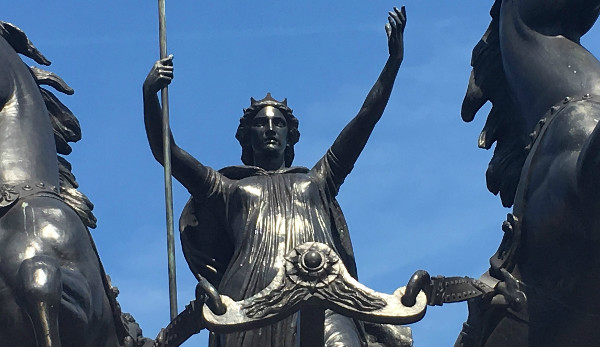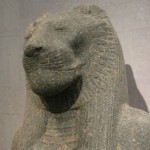Hail Brigantia, Royal Daughter
Great Queen, Heavenly One
Rider in the Chariot
Radiant Flame of Gold
Loosener of the Fiery Arrow
Precise in your aim
Every day that I sing your praises
I shall not be killed
I shall not be persecuted
I shall not be imprisoned
I shall not be injured
I shall not be abandoned
No power of earth shall bury me
No power of fire shall burn me
No watery death await me
No wind shall bend my will
Under the banner of Brigantia
Your spear is my protection
In the dark hours before dawning
I shall stand, I shall stand

Hail Brigantia
For many of us, the season of Imbolc is the season of the Celtic Goddess whose names we know from ancient inscriptions and from her assimilation in the Christian era into the panoply of saints. She is Bride of the Scots, Brigid of the Irish, Berc’hed of the Bretons, Brigantia of Britain and Gaul. Like all Great Goddesses, she is honored in many facets.
She is the gentle healer, the bard, the patroness of creativity and craftwork. She is also a goddess invoked by warrior men and women as they rode their chariots into battle. There are times when we need a warrior Goddess and it is in this aspect that we may need her now.
The Shadow of Aquarius
We are in the first decades of the Age of Aquarius, which lasts for just over two thousand years, a mere ‘month’ in the cycle of a Great Year. Two decades ago, the Jungian Analyst Murray Stein wrote:
“History and myth converge at moments like this, and fears and expectations reach a crescendo. As the rapidity of change accelerates, it becomes evident that no one, not even the people best equipped with the fastest computer networks, can register its myriad details, let alone control them. The times rush ahead like a swollen river, our destination directed by forces beyond our understanding, never mind our control. An end and a beginning are about to coincide.” (-Stein 1998, Transformation: Emergence of the self)
This year, with the entry of the sun into the astrological sign Aquarius, the upheavals in the microcosm match those greater upheavals of the change of the Aeon. The world took a deep breath and watched as America elected its new head of state. In the twentieth century, when the esoteric world first talked about the dawning of the Age of Aquarius, it was thought that it would be a dawn of all the positive qualities of Aquarius. We hoped for a an Age of humanism, in which human beings would realize the importance of the uniqueness and autonomy of each individual, but coupled with an understanding of our deep interconnectedness.
Carl Jung wrote about the collective unconscious, the group psyche of humankind. We looked to a new dawning of this deeper and wider consciousness that would help us to overcome barriers of separation and to have an indwelling sense of how each one of us is a cell in the greater whole.
But new births come with birth pangs. At the beginning of a two-thousand year cycle, we are experiencing not only the hopes of Aquarius, but also its shadow. Each Aeon has a shadow side, even as each of us as individuals has a shadow. The Age just passed was Pisces, an Age which sought to teach universal love, but its shadow was the negative side of Virgo. The ideals of spiritual teachers became codified texts and rules. Conflict developed in the human psyche between spirit and matter, soul and body, spirituality and sexuality.
In the current era, we have sought to overthrow the rules and to liberate the body, but now we are experiencing the shadow side of Aquarius. This is the tyrant King, the negative side of Leo. All over the world, people are abandoning the democratic vision of free human beings with collective responsibility for ruling themselves. Instead, people are handing over their autonomy to fear-creating dictators who seek to divide and rule.

How Can We Pagans Respond to These New Challenges and Crises?
We are fortunate in having many gods. We have gods for peace and for war, for passion and for reason, for protection and attack. In this era, we do well to choose as our deities those that inspire us to right action, right thought, right love, and right spirit. It is easy to fall prey to hate. Hate is always easier than love, negation than creation. Deep within us are important aggressive impulses. They are important because they are the impulses that help our species survive, but if not channeled positively they can destroy us.
There is much in the world today that as Pagans we need to challenge, counteract, and actively seek to change. To stand against the irrational, the fearful, the hate-mongering, the destroyers, we need not the heady and intoxicating wine of negative leonine, self-righteous wrath, but the cool, clear, analytical and strategic thinking that is Aquarius at its best.
Some of the inspiration for contemporary Paganism comes from our indigenous roots. We also owe much to the high Pagan cultures of Africa and Europe – Egypt, Crete, Greece, Rome, and others too many to name. One of the great inspirations of the esoteric Pagan revival was the Corpus Hermeticum, a text of two thousand year old Greco-Egyptian wisdom teachings compiled in the early centuries of the transition from Aries to Pisces.
Who else have civilized the world, and built the cities, if not the nobles and kings of Paganism? Who else have set in order the harbours and the rivers?… They have discovered the art of healing the soul; they have also made known the art of healing the body. They have filled the Earth with settled forms of government, and with wisdom, which is the highest good. Without Paganism the world would be empty and miserable. (-Scott, 1985 ed.; first published 1924, Hermetica: the ancient Greek and Latin writings which contain religious or philosophic teachings ascribed to Hermes Trismegistus, page 105)
The Corpus Hermeticum boldly credits Pagans for the engineering, architecture, medicine and science that was to be lost for centuries, when the new era rejected past knowledge and insisted that its fantasy of a geocentric universe was right, despite all evidence to the contrary. We see the same pattern today – the rejection of science for ideology, of facts for self-serving beliefs.
Let the Light Shine in the Darkness on Brigantia’s Day
Some of what we seek in contemporary Paganism is romanticism and fantasy. This is fine. The world of the creative imagination is one of humankind’s greatest gifts, but we also need a thinking that is of Earth and Air, of realism and clarity. It is important to remember that this too is a fundamental part of what contemporary Paganism is about.
As Pagans, we honor our warrior goddesses, and we can remind ourselves that over time Brigantia became fused with wise Minerva. To ride safely through the changes to come, we must hold true to ideals and values in the face of all that would pressurize against them. We must honour science, history, and fact. We must become politically active to influence those in power to exercise their responsibilities wisely and well. We must support and find strength and inspiration from one another, bonding ever closer as the upheavals come.
Sometimes bad changes can bring new light and dawning, as we realize the value of what is all too easily lost. Let the light of Strength and Wisdom shine in the darkness on Brigid, Bride, Brigantia’s day.

References
Scott, Walter, ed. 1985 ed.; first published 1924. Hermetica: the ancient Greek and Latin writings which contain religious or philosophic teachings ascribed to Hermes Trismegistus. Translated by W. Scott. Vols. I: Introduction, texts, and translation. Boston, MA: Shambhala.
Stein, Murray. 1998. Transformation: Emergence of the self. College Green, TX: Texas A&M University Press.














